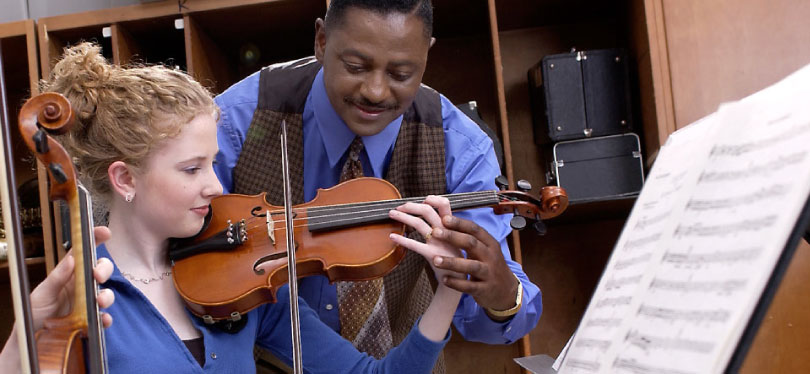
You have probably at some point heard your student’s teacher, a Paige’s Music sales rep, or even your student mention taking private lessons. There are many factors to consider when deciding upon private lessons and a private lessons teacher. The goal of this article is to help you make an educated decision when it comes to private lessons.
First, you might be wondering, who are private lessons instructors? Private lessons teachers are typically professionally trained musicians who are proficient at one or more instruments. Anyone who is skillful, has a good knowledge of music theory as well as basic teaching methods can become a private instructor. These individuals often teach students ranging from beginner to advanced skill levels.
Next, what do private instructors do? As you can almost certainly assume private instructors provide a one-on-one teaching environment for a student. More specifically, they can focus on playing technique, tonal quality, precise excerpts or music the student might be playing in class or even individual solo pieces for contest. They are able to provide direct and immediate feedback to the student helping them implement the best overall performance standards.
There are a few places where you can inquire about finding a private instructor for your student. Our first recommendation is always to speak to the student’s band or orchestra teacher at school. They may have a preferred list of private instructors they have worked with in the past and would be comfortable referring you. Another place to search is the Paige’s Music website. We do provide a list of private instructors categorized by instrument for your convenience. Private lessons can take place at the student’s school, your home or the private instructor’s home.
Another common question we get asked at Paige’s is when should parents start their students in private lessons? While we would all like to respond with a resounding “NOW”, the answer might not be so simple. It really depends on the student and their needs. For example, if your student is struggling with their new instrument, it might benefit them to get some one-on-one instruction from someone more adept on their instrument. Additionally, many students consider private lessons further into their playing careers as a way of focusing on more specific techniques that sometimes are not covered in general band or orchestra class. Private lessons are often essential for students wanting to participate in solo and ensemble competitions or auditions for outside groups or college. Again, the student’s band or orchestra teacher is your best resource for determining if private lessons would benefit your student.
Finally, why private lessons? The answer is simple, to help your student get better. As discussed before, private lessons provide a professional environment for your student to get focused help with all aspects of playing their band or orchestra instrument. Whether your student is just starting out or is searching for more advanced instruction, there is always something to learn through individual, private lessons.
Our store ours are slightly different than year’s past based on the way the holidays fell on the calendar this year.
Here is a rundown for the rest of 2015.
Wednesday, December 30th – Open 10am – 6pm
Thursday, December 31st – Open 10am – 3pm
Friday, January 1st – CLOSED
Saturday, January 2nd – CLOSED
If you need to have something delivered to your school on Monday, January 4th, please place your order by Thursday before 3pm.
Thanks for a great 2015. Please have a safe and happy New Year from all of us at Paige’s Music!